Many thanks to SWLing Post contributor, Jock Elliott, who shares the following guest post:
Some radio-related books you might want to read
By Jock Elliott, KB2GOM
Radio-related books – books in which radio is not the main subject but plays a significant role in the storyline or plot (whether it is fiction or non-fiction) – can inspire us. Whether we are shortwave listeners, HF utilities monitors, or VHF/UHF scanner fans, radio-related books can heighten our appreciation of what we do, I think.
With that in mind, below are some radio-related books that I have read and can heartily recommend.
This Is Chance!: The Shaking of an All-American City, A Voice That Held It Together
In 1964, a 9.2 earthquake shook Anchorage, Alaska, with a ferocity not seen in North America before.
When the shaking stopped, night fell; the city went dark, and people began tuning their transistor radios to hear a familiar voice.
Genie Chance, a part-time reporter and working mother, would stay on the air almost continuously for the next three days as an eclectic group of officials and volunteers worked to begin picking up the pieces. This is a moving story about radio, ham radio (a bit), and people rallying together.
Ten Hours Until Dawn: The True Story of Heroism and Tragedy Aboard the Can Do
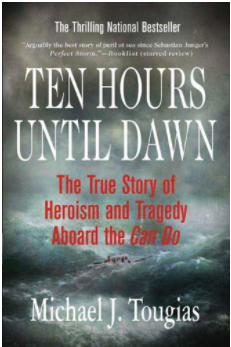 In 1978, in the midst of a blizzard, the tanker Global Hope floundered on the shoals in Salem Sound off the Massachusetts coast.
In 1978, in the midst of a blizzard, the tanker Global Hope floundered on the shoals in Salem Sound off the Massachusetts coast.
In response to Mayday calls, the Coast Guard dispatched a patrol boat. Within an hour, the Coast Guard boat lost its radar, depth finder, and engine power in horrendous seas.
Pilot boat Captain Frank Quirk was monitoring Coast Guard VHF radio and decided to act.
Read this book sitting by the fire, far from the sea. A chilling account.
The US Navy’s On-the-Roof Gang: Volume I – Prelude to War
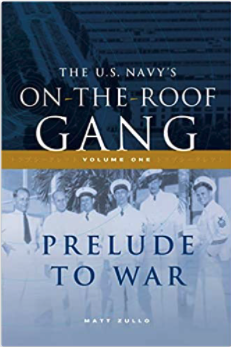 Between WWI and WWII, the US Navy realized the need to intercept and decode Japanese military and diplomatic radio traffic.
Between WWI and WWII, the US Navy realized the need to intercept and decode Japanese military and diplomatic radio traffic.
Matt Zullo calls this book a novel because he had to fill in the blanks in some areas, but most of the book is based on official documentation and personal recollections.
It is a ripping good yarn, written in an engaging style, that spans the globe from Samoa to Greenland, and I found it fascinating and will soon be reading the second volume.
The Road Home
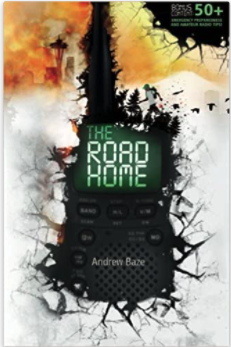 After an earthquake rips Seattle, Robbie and his father have to rely on their wits and some new-found skills to get home safely.
After an earthquake rips Seattle, Robbie and his father have to rely on their wits and some new-found skills to get home safely.
This fictional story includes many emergency preparedness and ham radio tips. Some are a bit dated, but many are still applicable today.
Well worth the reading.
The Day After
After learning that his neighbor Katy is injured, alone, and needs help, Robbie ventures out, and a short trip across the city will turn into a race for survival that cleverly illustrates useful emergency preparedness while emphasizing the importance of communication and thinking ahead.
Again, in my humble opinion well worth the time.
And now . . . it’s your turn!
What radio-related books – fiction or non-fiction — would you recommend? As a dyed-in-the-wool, unrepentant, not-on-the-12-step-program bookaholic, I’m always looking for a good read!
Please note that all SWLing Post Amazon links are auto-converted to affiliate links which support the site at no cost to you. Your purchase helps support the SWLing Post.

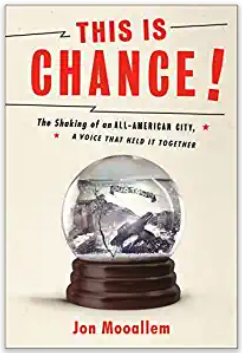
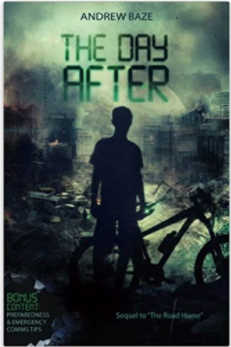
I don’t read much for fun, as my writing/editing day job requires A LOT of reading, but a book that immediately came to mind for this is “Thunderstruck” by Erik Larson, who’s better known for “The Devil in the White City.”
The nonfiction story in “Thunderstruck” features Marconi and the role that early radio communication played in an international criminal chase. From the book’s summary: “The saga of how the lives of the inventor of wireless and of Britain’s second-most famous murderer (after Jack the Ripper) intersected during one of the greatest criminal chases of all time.”
I don’t read fast, but I read that one in a matter of a couple days.
On the topic of the OTRG, I might suggest E.E Okins book of personal memories entitled, To Spy or Not to Spy. His experiences at Pearl Harbor before and after the attack are interesting revelations. His comments regarding the Japanese in California provide a different perspective with regard to the internment camps. His anecdotes regarding Savant Syndrome among staff are enlightening. There are other stories of COMINT that are interesting, as well as, just plain tales of being in the Navy.
Surprisingly, copies of his little book are still available although he reportedly destroyed all copies before he passed away decades ago.
Thanks, Mark, I’ll see if I can find a copy.
Recommended Radio Books
—————————————
On the Air: The Encyclopedia of Old-Time Radio – by John Dunning
http://www.amzn.com/0195076788
Empire of the Air: The Men Who Made Radio – by Tom Lewis
http://www.amzn.com/0060182156
FM: The Rise and Fall of Rock Radio – by Richard Neer
http://www.amzn.com/B000Q9F1KE
The Network: The Battle for the Airwaves – by Scott Woolley
http://www.amzn.com/0062242768
40 Watts from Nowhere: A Journey into Pirate Radio – by Sue Carpenter
http://www.amzn.com/0743229886
Excellent. Thanks!
Two O’Clock Eastern Wartime by John Dunning
Dunning is a great story teller. The cover of the book caught my attention in Chapters, Canada’s version of Barnes and Noble, showing a radio transmitter. Of course a radio transmitter is going to grab my attention.
The fiction book includes mystery, suspense, Nazi spies, murder, romance, office politics, race relations and of course radio.
Most of the story takes place at small fictional radio station WHAR on the New Jersey coast. Woven into the story is a treasure trove of detail about how a radio station in 1942 would sound and feel.
I bought the book in both print and audio form and thoroughly enjoy it.
If you enjoy a good mystery (with quite a surprise ending) and are a fan of radio, you will love this book.
Dunning in a previous life hosted a radio program about Old Time Radio and wrote books on the subject
Fred, sounds like a book right up my alley. I will have to check it out.
I have both volumes of Up On the Roof. Fascinating story. There’s a nice video presentation on YouTube:
https://youtu.be/qjrhIi93vsA
I’ll have to grab the other books you recommended.
Like you, I’m an avid reader, with several books going at the same time. And many, many books cued up to read. At present over 150 books cues up in my Kindle and about the same number (different books) cued up in Google Play Books. And I keep adding to the cue. Hopefully, I’ll live long enough to read most of them.
I went through my books and selected some books to recommend. Most I have read and really enjoyed them. I tried to keep it mostly dealing with communications (both radio and a couple on TV).
Here we go:
Broadcasting Baseball
A History of the National Pastime on Radio and Television
by Eldon L. Ham
CRYSTAL CLEAR
The Struggle for Reliable Communications Technology in World War II
by Richard J. Thompson, Jr.
The Bizarre Careers of John R. Brinkley
by Ralton Lee
The Bizarre Careers of John R. Brinkley tells the story of the infamous “Goat Gland Doctor”—a controversial medical charlatan, groundbreaking radio impresario, and prescient political campaigner—and recounts his amazing rags to riches to rags career.
Border Radio:
Quacks, Yodelers, Pitchmen, Psychics, and Other Amazing Broadcasters of the American Airwaves
by Gene Fowler, Bill Crawford
The Searchers
How Radio Interception Changed the course of Both World Wars
by Kenneth Macksey
Life on Air
A History of Radio Four
by DAVID HENDY
London Calling
Britain, the BBC World Service and the Cold War
by Alban Webb
Russia in the Microphone Age
A History of Soviet Radio, 1919–1970
by Stephen Lovell
The Secret Listeners
How the Y Service Intercepted German Codes for Bletchley Park
by Sinclair McKay
THE VICTORIAN INTERNET
The Remarkable Story of the Telegraph and the Nineteenth Century’s On-line Pioneers
by TOM STANDAGE
When Pirates Ruled the Waves
By Paul Harris
Intrigues, threats, boarding parties, smuggling, shipwreck, danger and adventure on the high seas – they all form part of the remarkable story of the pop radio pirates.
Foxhole Radio: the ubiquitous razor blade radio of WWII
by Brian Carusella
Sealand: The True Story of the World’s Most Stubborn Micronation and Its Eccentric Royal Family
by Dylan Taylor-Lehman
Brass-Pounders: Young Telegraphers of The Civil War
by Alvin F. Harlow
In this fascinating volume, Alvin Harlow, recounts many of the adventures of the Civil War telegraphers, who despite their civilian status shared the dangers of the soldiers as they sent massages back to the various headquarters and generals.
Waves of Hope
by Ronald Edward Negra
Using a shortwave radio during World War II, the newlywed wife of an American soldier becomes one of the only communication links to the families of American prisoners of war as they struggle with anxiety, fear, and heart-wrenching emotions worrying about the fate of their captured sons, husbands, and brothers.
To the Moon and Back: Essays on the Life and Times of Project Diana
by Cindy Stodola Pomerleau
On January 10, 1946, the US Army successfully bounced radio waves off the moon–the first-ever extraterrestrial communication, the birth of radar astronomy, and the opening salvo in the Cold War. The author was just shy of three years old at the time, and her father, E. King Stodola, was Scientific Director of the team that carried out the experiment, code-named Project Diana.
Hello, Everybody!: The Dawn of American Radio
by Anthony Rudel
Crosley: Two Brothers and a Business Empire That Transformed the Nation Kindle Edition
by David Stern, Michael Banks, Rusty McClure
The Invisible War: The Untold Secret Story of Number One Canadian Special Wireless Group
by Gil Murray
Friendlyvision: Fred Friendly and the Rise and Fall of Television Journalism
by Ralph Engelman, Morley Safer
The Murrow Boys: Pioneers in the Front Lines of Broadcast Journalism
by Lynne Olson, Stanley Cloud
73
Bill WD9EQD
Smithville, NJ
Wow, Bill, thanks! I’ll have to check those.
Luckily, our local library has the ability to borrow kindle books. They don’t always have what I want, but sometimes they do.
Bill, you know the definition of a true bookaholic, don’t you?
A true bookaholic is a person, who, if they stop at a bookstore on the way home, lie to their better half and say they went to a bar . . .
There are two very excellent novels that focus on Peruvian radio.
The first is the very funny and unforgettable “Aunt Julia and the Scriptwriter” by Mario Vargas Llosa. The book even got a small cult-following in US college campuses in the 80s and 90s. The link below tells a bit more about the book and how I met the person the scriptwriter was supposedly based on. In 1990 the book was made into a movie called “Tune In Tomorrow” but they moved the location from Lima to New Orleans so it would better appeal to a North American audience. If you like funny books, read this one.
The other is the very serious “Lost City Radio” by Daniel Alarcon (2007). The book takes place in a fictitious country (which is clearly meant to be Peru) and takes place ten years after a long guerilla war had ended. The main character, Norma, is a woman who hosts a radio program called “Lost City Radio” which helps people find out what happened with long-lost family members or, with luck, reunite with them. Norma’s own husband had disappeared during the war. While the book’s subject is Peru’s long guerilla war and the effect it had on peoples’ lives, much of the story takes place at the radio station. And the author clearly understands the role that radio has in Andean society. It’s a very good read, but not a happy one.
http://www.pateplumaradio.com/south/bolivia/tiajulia.html
Don, thanks for the recommendations; they sound interesting.
“Empire of the Air” is a great book and documentary.
https://en.m.wikipedia.org/wiki/Empire_of_the_Air:_The_Men_Who_Made_Radio
I’ll take a look at it.
“Star’s Reach,” by John Michael Greer
Imagine a mash-up of “Lord of the Rings” and “Contact,” set four hundred years into America’s future. Everything went wrong in the mid-21st century, and now we’re climbing out the resulting dark age into a more stable medieval-tinged period. Radio figures prominently throughout: the main artifact that sets things in motion is an old GWEN (Ground Wave Emergency Network) transcript, common folk get their news via crystal sets, there’s a Radioman’s Guild that provides regional communications, and the main quest is not to chuck a magic ring into a volcano, but to find the two way radio telescope used to contact aliens in the times just before things fell apart. For all this radio-activity though, radio is just one of the technological remnants in the overall story.
It’s a pretty wild ride. How do you admit to the aliens that you screwed up and crashed your planet’s ecosystem, and that’s why the phone’s been dead for three centuries? What do you say after that?
Intriguing!
The 2015 Pulitzer Prize for Fiction, a superb publication:
“All The Light We Cannot See” – WWII era drama featuring broadcasts, radio, and antenna
https://en.wikipedia.org/wiki/All_the_Light_We_Cannot_See
That is a phenomenal read. I, too, highly recommend All The Light We Cannot See: https://swling.com/blog/tag/all-the-light-we-cannot-see/
It’s now on “the list.”